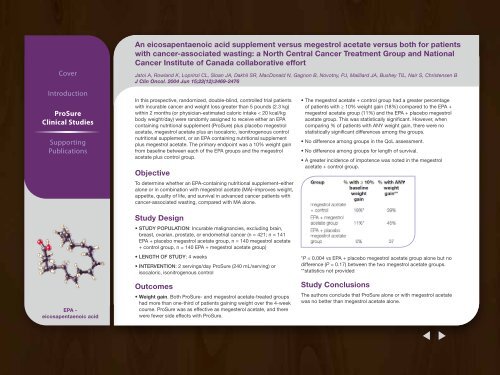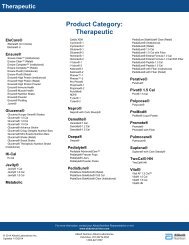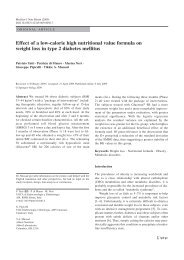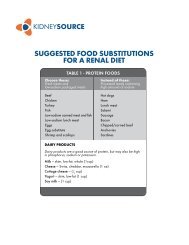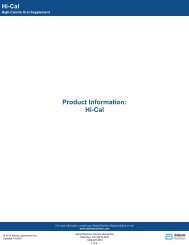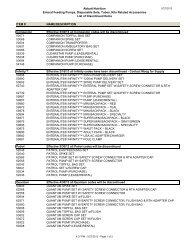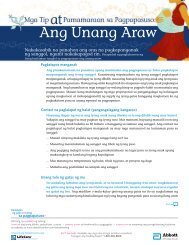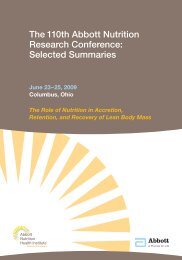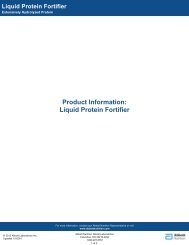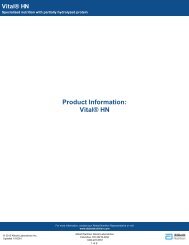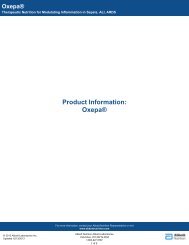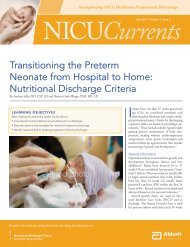Cover Introduction ProSure Clinical Studies ... - Abbott Nutrition
Cover Introduction ProSure Clinical Studies ... - Abbott Nutrition
Cover Introduction ProSure Clinical Studies ... - Abbott Nutrition
You also want an ePaper? Increase the reach of your titles
YUMPU automatically turns print PDFs into web optimized ePapers that Google loves.
<strong>Cover</strong><strong>Introduction</strong><strong>ProSure</strong><strong>Clinical</strong> <strong>Studies</strong>SupportingPublicationsAn eicosapentaenoic acid supplement versus megestrol acetate versus both for patientswith cancer-associated wasting: a North Central Cancer Treatment Group and NationalCancer Institute of Canada collaborative effortJatoi A, Rowland K, Loprinzi CL, Sloan JA, Dakhil SR, MacDonald N, Gagnon B, Novotny, PJ, Mailliard JA, Bushey TIL, Nair S, Christensen BJ Clin Oncol. 2004 Jun 15;22(12):2469-2476In this prospective, randomized, double-blind, controlled trial patientswith incurable cancer and weight loss greater than 5 pounds (2.3 kg)within 2 months (or physician-estimated caloric intake < 20 kcal/kgbody weight/day) were randomly assigned to receive either an EPAcontaining nutritional supplement (<strong>ProSure</strong>) plus placebo megestrolacetate, megestrol acetate plus an isocaloric, isonitrogenous controlnutritional supplement, or an EPA containing nutritional supplementplus megestrol acetate. The primary endpoint was a 10% weight gainfrom baseline between each of the EPA groups and the megestrolacetate plus control group.ObjectiveTo determine whether an EPA-containing nutritional supplement–eitheralone or in combination with megestrol acetate (MA)–improves weight,appetite, quality of life, and survival in advanced cancer patients withcancer-associated wasting, compared with MA alone.• The megestrol acetate + control group had a greater percentageof patients with ≥ 10% weight gain (18%) compared to the EPA +megestrol acetate group (11%) and the EPA + placebo megestrolacetate group. This was statistically significant. However, whencomparing % of patients with ANY weight gain, there were nostatistically significant differences among the groups.• No difference among groups in the QoL assessment.• No difference among groups for length of survival.• A greater incidence of impotence was noted in the megestrolacetate + control group.EPA -eicosapentaenoic acidStudy Design• Study Population: Incurable malignancies, excluding brain,breast, ovarian, prostate, or endometrial cancer (n = 421; n = 141EPA + placebo megestrol acetate group, n = 140 megestrol acetate+ control group, n = 140 EPA + megestrol acetate group)• Length of Study: 4 weeks• Intervention: 2 servings/day <strong>ProSure</strong> (240 mL/serving) orisocaloric, isonitrogenous controlOutcomes• Weight gain. Both <strong>ProSure</strong>- and megestrol acetate-treated groupshad more than one-third of patients gaining weight over the 4-weekcourse. <strong>ProSure</strong> was as effective as megesterol acetate, and therewere fewer side effects with <strong>ProSure</strong>.*P = 0.004 vs EPA + placebo megestrol acetate group alone but nodifference (P = 0.17) between the two megestrol acetate groups.**statistics not providedStudy ConclusionsThe authors conclude that <strong>ProSure</strong> alone or with megestrol acetatewas no better than megestrol acetate alone.


